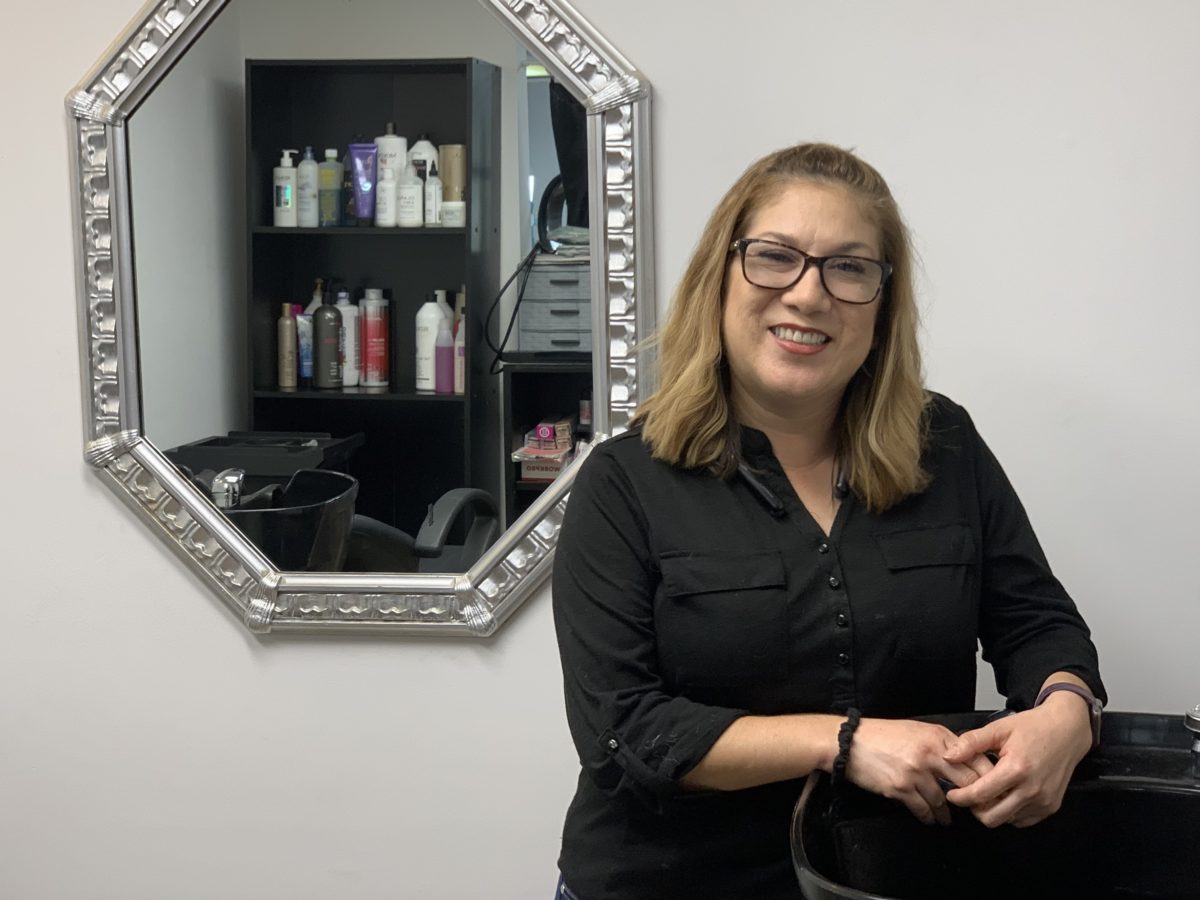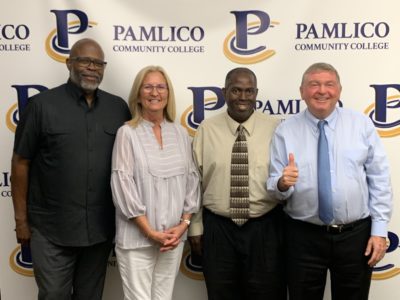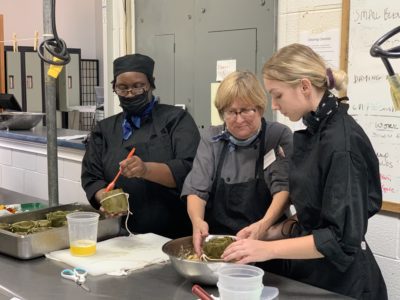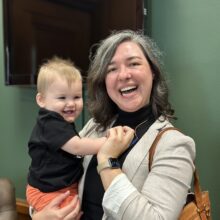
|
|
When Nidia Martinez began her career as a hairdresser at the age of 15 in Mexico, she didn’t imagine owning her own salon in Washington, North Carolina 30 years later.
Now Martinez is not only the owner and operator of Nidia’s Salon, she’s a representative of small business owners in the Hispanic community, serving on the city’s Human Relations Council.
Martinez acknowledges the role her own hard work and determination have played throughout her journey to become a small business owner. But she also credits Beaufort County Community College (BCCC).
“Continuing education has been there for me all the time,” Martinez said.
In a study completed late last year, BCCC was found to have an annual economic impact of $49.2 million. For every dollar invested in BCCC, students gain $4.20 in lifetime earnings, taxpayers gain $2 in added tax revenue and public sector savings, and society gains $7.10 in added state revenue and social savings.
Martinez represents the effects of that economic impact on one woman, her family, and her community.
‘It’s gonna have to be cosmetology.’
Martinez began her cosmetology career at a young age.
She explained that when she was growing up in Mexico, students were not required to attend school beyond eighth grade.
“I started (cosmetology school) at 15 and graduated at 16. Then I got married at 18 and came to the States,” Martinez said.
By 2003, Martinez and her husband had settled in Beaufort County. While he worked jobs that frequently took him out of town, she focused on caring for their two young sons. She also did hair for clients at her home and worked as a translator at a local hospital’s birth center.
A doctor she worked with suggested she take classes at BCCC to become a nurse and earn more money.
“But I’m not a nurse!” Martinez said. “If I’m gonna go back to school, it’s gonna have to be cosmetology.”
She decided to see what it would take to get a cosmetology license that would enable her to work at salons. She met with Clay Carter, director of personal enrichment initiatives at BCCC, who gave her a tour of the college’s cosmetology department. She was sold.
When the folks at BCCC learned she had not gone to high school in Mexico, they told her she would have to earn her GED before she could start her cosmetology program. Martinez felt discouraged and overwhelmed.
“But they went ahead and signed me up like, ‘You’re gonna get it!’” Martinez said. “So I got my GED in three months.”
Martinez told EdNC that the greatest challenge she faced as a cosmetology student was not speaking English fluently.
“Don’t ask me how I translated at the hospital! I learned ‘push’ and ‘count to ten,’” Matinez laughed.
Martinez is grateful she had already been trained in cosmetology as a teenager, because that prior knowledge reduced the burden of the language barrier. But going back to school wasn’t easy.
According to Martinez, there were originally 23 students in her cohort. An instructor predicted only three would graduate. With encouragement from her classmates, Martinez was one of them.
“With a 4.0,” she pointed out.
Sign up for Awake58, our newsletter on all things community college.
‘I knew she was a rockstar’
After earning her cosmetology license in 2005, Martinez began working as an independent operator at a series of salons in Washington.
Being able to manage her own appointments with clients was a high priority for Martinez at that time. Her older son was coping with ADHD. Her younger son was diagnosed with autism at age 3, which required her to take him to four different types of therapy every week.
After her younger son graduated from Beaufort County Early College High School in 2019 — he now studies theater at East Carolina University — Martinez no longer needed the same flexibility she had so valued as an independent operator. She started thinking about the next phase of her career.
But when she learned the salon where she’d been working would be closing its door that summer due to the 95-year-old proprietor’s retirement, she hadn’t yet figured out what that next phase would be.
“You know, I was used to a private little room and my space, and I didn’t know where to go,” Martinez said. “Then somebody tells me a barber shop was for sale.”
Washington Squire Barber Shop at 118 Minuteman Lane in Washington was owned by Leonard Buck, and he was indeed looking to sell.
Martinez was interested in buying, but she didn’t know where to start. Because she had worked at several local salons over the course of her career, she was able to immediately tap into a network of owners and their clients for advice.
One of those clients was Lentz Stowe, the director of BCCC’s small business center.
“I knew she was a rockstar on campus among the (BCCC) staff,” Stowe said.
Stowe helped Martinez analyze the market, look into financing options, and assess risks. His efforts helped Martinez feel more confident about buying Buck’s shop — until she learned it was in a flood zone.
“I chickened out,” Martinez said. “I did the math, and I said no, this is not gonna work.”
But Martinez still needed a job.
“So I told (Buck), I don’t think I’m gonna buy, but can I work with you?” Martinez said. Buck agreed to the new partnership and hit pause on selling the shop.
Things went smoothly until the coronavirus pandemic forced hair salons and barbershops to shut down for two months in 2020. When they reopened, demand for their services was high.
“Between me and (Buck), we saw 100 people in one week,” Martinez said. “It was crazy.”
After that week, Martinez said Buck decided it was really time to sell.
Martinez was still nervous about buying a business located in a flood zone, but a client mentioned hearing there had been changes to the flood zones in the area and Buck’s property was no longer in one. That news was a game changer for Martinez.
With support from Stowe and BCCC’s small business center, Martinez bought the barber shop and began converting it to her own salon.
‘It’s my time’
Around the time when she bought the shop, Martinez began suffering the effects of a car crash that had occurred months earlier.
“It was very scary,” Martinez said. “For nine months I could hardly walk.”
Even though she promised her husband that if she bought the shop, she wouldn’t do any work on it until she felt better, she was still there for two months of weekends painting and making other cosmetic changes.
She wasn’t doing it alone.
The Washington Chamber of Commerce connected her to an interior designer who advised her on color schemes. Her brother-in-law, an electrician, replaced all of the lamps. And her clients got involved too.
One client designed the salon’s new logo, scissors with butterfly wings, which Martinez said is a reference to new beginnings.
Clients even chose the name of the salon via a poll Martinez posted on Facebook ‒ “Nidia’s Salon,” her husband’s suggestion.
“All my clients brought me presents, the plants, the flowers, the decorations,” Martinez said. “Everybody wanted to bring something to Nidia’s.”
Maybe that’s because of what Nidia has brought to them.
“When she was in (another) salon, I just always had warm feelings when I walked in,” Stowe said.
Martinez is humbled by the community’s support of her small business. Whether she’s being invited to speak at the town’s Juneteenth Freedom Festival or host a Latino community meeting, being a business leader is a new role for her.
“This has been part of my life, being a hairdresser,” Martinez said. “The other part is my family. My husband worked out of town all the time, so I had to be there double, you know.”
“I’ve been a mom of a special kid for all my (adult) life,” Martinez said. “And then my other son, he got into drugs.”
With her younger son in college and her older son now “clean and sober” — as Martinez proudly puts it — she’s excited about what’s next for her.
“I feel like this is, right now, for the first time in 45 years, it’s my time.”
Recommended reading



